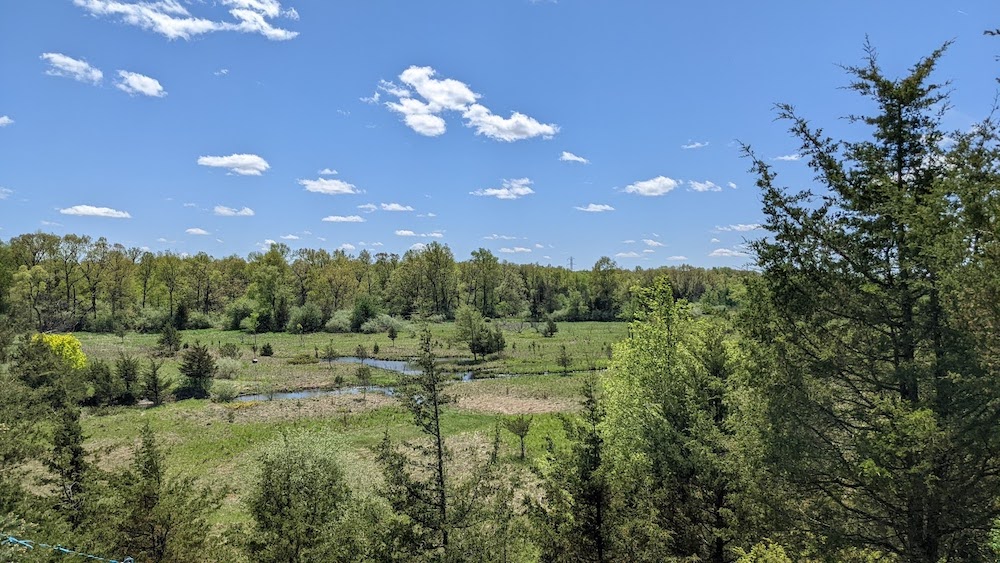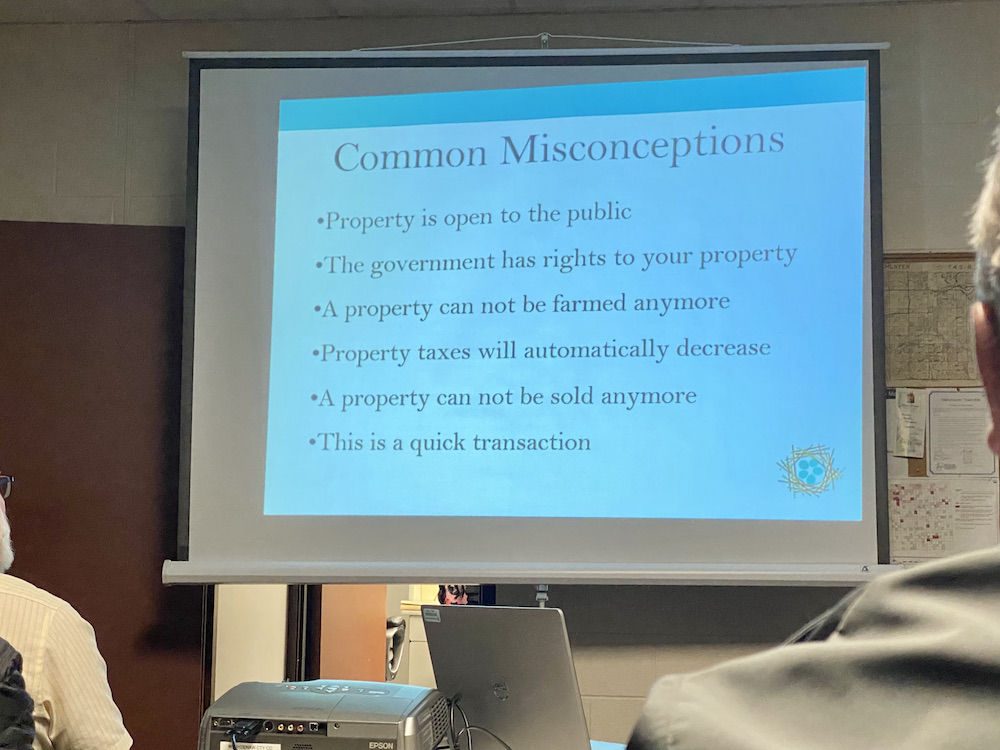Environmental incentives to conservation easements: Residents learn about land management & preservation

Arnold Property adjacent to Watkins State Park and Nature Preserve was recently preserved through a conservation easement. Photo courtesy of Land Legacy Conservancy.
by Sara Swanson
While “natural areas” can be hard to pin a definition to, a perennial topic of discussion is how to preserve them. Along with agricultural land, our natural areas are what give the Manchester area its rural character. What can you do? Preventing pollution, erosion, and loss of habitat (to name a few concerns) through land management all the way up to preventing future development through conservation easements or even the donation or sale of your land to become a nature preserve.
Thursday evening, despite the sleet, more than 30 area residents came out to the Manchester Township Hall to learn about different things they can do to assess, manage, and protect their land, whether they farm their land or have natural areas on their property. After an introduction by Manchester Township planning commission member Sybil Kolon (read related editorial), attendees heard presentations by the River Raisin Watershed Council, Washtenaw County Conservation District, Washtenaw County Parks and Recreation Commission, and Legacy Land Conservancy. Barry Lonik finished the evening with a talk on land preservation millages, which are a way for all residents, even non-landowners, to get involved in local land preservation.
Most of the Manchester area is located in the River Raisin Watershed (while the northern parts of Freedom and Sharon Township are in the Huron River Watershed). The River Raisin Watershed Council monitors the water, leads clean-ups, facilitates river recreation, and works to educate residents on the watershed and how they can help sustain the plants and wildlife living in it. If you live in the watershed, they are available to answer questions about your land, regardless of whether you farm it or not. You can learn more or contact them at riverraisin.org.
Washtenaw County Conservation District is the Washtenaw branch of a state organization that provides resources and help to farmers and non-farming community members with the management of their land. For farmers, they provide technical assistance, trainings, and even rent equipment used in more environmentally responsible farming like cover-crop planting. They also offer classes for non-farmers, like the Vernal Pool online training coming up soon, and the creation of conservation plans for residents with natural areas on their land. You can learn more or contact them at washtenawcd.org.
Four programs exist to help active farmers with conservation efforts. One option for farmers is to become MAEAP verified. All types and sizes of farms can participate in the program. It is voluntary, confidential, and helps the farmer reduce pollution risks. You can learn more at maeap.org. Both the Environmental Quality Incentives Program (EQIP) and the Conservation Stewardship Program (CSP) provide technical and possibly financial assistance for conservation efforts. You can learn more or contact them at nrcs.usda.gov where you should then click on “getting assistance.” The USDA’s Conservation Reserve Enhancement Program (CREP) pays cash crop farmers to remove environmentally sensitive land from production. You can learn more or contact them at www.fsa.usda.gov/programs-and-services and clicking on “conservation programs” and then on “Conservation Reserve Enhancement Program.”
The second half of the presentation Thursday evening was how residents can protect their land from development in the future, whether or not it is actively being farmed.
Washtenaw County Parks and Recreation Commission (WCPRC) talked about their Natural Areas Preservation Program (NAPP). Landowners who want to ensure their land isn’t developed in the future can donate or sell (or a combination of both) their land to be turned into a nature preserve managed by the WCPRC. Local examples of county nature preserves include the Leonard Preserve, the Clark & Avis Spike Preserve, the Ervin/Stucki Preserve, Sharon Short Hills Preserve, and Riverbend Preserve.
There is another option, though, for landowners who want to maintain ownership and control over their land while preventing future development, and that is conservation easements. A conservation easement is when the landowner donates or sells the development rights to the land. They are still able to farm it, hunt on it, actively manage it, pass it down to their children, and sell it if they want to. It remains private property. The easement prevents them, or anyone in the future, from developing it, subdividing it, or clear-cutting it. Currently solar farms are not allowed under terms of the easements, although solar panels for home and agricultural use are. Both farmland easements and natural-area easements exist and differ. Farmland easements allow for new agricultural buildings and are flexible to allow for changes due to advancements in agriculture. When easements are purchased, the value of the easement is the difference in the value of the land with and without the development rights. For more information or to contact WCPRC about NAPP visit www.washtenaw.org/2798/.
The county is not the only land preservation program managing preserves and purchasing easements. Legacy Land Conservancy (LLC) is a nonprofit, accredited land trust serving Washtenaw, Lenawee, and Jackson Counties. They usually work with landowners who own at least 20 acres but make exceptions for smaller properties with special natural features. LLC manages the Sharon Hills Nature Preserve and recently protected the Arnold Fen next to Watkins Lake State Park and County Preserve through a conservation easement. To contact them or for more information visit https://legacylandconservancy.org.
One benefit of agricultural easements that may not be immediately apparent is that it makes farmland affordable to young farmers. By removing development rights, the cost of farmland drops from around $8,000/acre to $3,000 or $4,000/acre, much more affordable for young farmers, and they no longer have to compete against developers to purchase it. Additionally, a resource, MiFarmLink, exists to help connect retiring farmers who don’t have anyone to take over their farm with young farmers, as well as connecting young farmers with older mentors. For more information visit mifarmlink.org.
It is important to note that none of these options are exclusive! You can have a conservation easement on your land, be a MAEAP–certified farm, be receiving environmental incentives, and learning about ways to actively protect the watershed through the management of your land, all at the same time.
At the end of the meeting, Barry Lonik talked about the countywide land preservation millage that passed in the early 2000s. It is through this millage that the county funds the purchasing of land and easements, and managing of the nature preserves. He talked about how townships are getting in on land preservation and passing their own millages to purchase easements and, in the case of Scio Township, create and manage their own nature preserves. He talked about how Dexter Township just passed a land preservation millage during the last election to the surprise of everyone, and encouraged those present to ask Manchester Township to put a land preservation millage on the ballot.
If you missed the meeting and are interested in these topics, feel free to contact any of the organizations mentioned above or attend the next presentation which is set for 6:30pm on April 17 in Bridgewater Township. Stay tuned for more details and the location!

Land Legacy Conservancy went over some common misconceptions regarding conservation easements at a meeting in Manchester Township last Thursday.






You must be logged in to post a comment Login